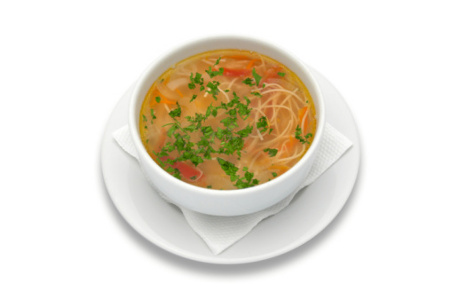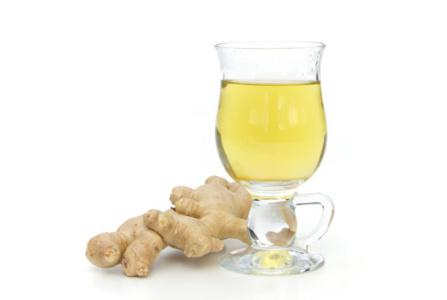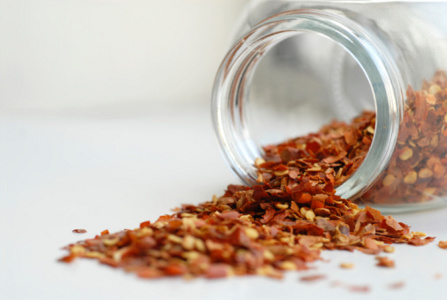Top 10 Foods to Fight the Flu
0 Comments
This Year's Flu -- Are You Ready?
This is the season for upper respiratory infections, seasonal influenza and the return of the 2009 H1N1 influenza virus. The best weapons against getting the flu are getting a flu vaccine, practicing good hygiene such as covering your cough and sneezes, washing your hands well and often, and getting proper nutrition and rest. Though foods might not actually kill the flu virus, certain foods boost your immune system and at the very least, make you feel better when ill. Photo: Getty Images

Chicken Soup
Chicken soup has been a remedy to treat the common cold and influenza virus for generations. Beside being a comfort food, chicken soup may actually decrease the inflammatory process associated with viral infections. Inhaling the vapors from a warm bowl of soup raises the temperature of the respiratory passages and loosens thickened mucus secretions. Photo: Getty Images

Orange juice
Orange juice is a good source of vitamin C. Clinical research shows that adequate intake of vitamin C helps relieve the symptoms associated with an upper respiratory illness and can shorten the duration of such infections such as the common cold and influenza. Photo: Getty Images

Blueberries
Blueberries are a rich source of vitamin C and rank very high on the scale of antioxidants. The vitamins and minerals, including zinc, in the berries boost the immune system. A strong immune system defends the body against bacterial and viral infections. Photo: Getty Images

Oysters
This is one food that you either like or hate, but oysters are the richest food source of zinc. Zinc is an important mineral in maintaining a healthy immune system. However, a person with a weakened immune system should avoid eating raw oysters. Broiling or grilling oysters will destroy any harmful bacteria. Photo: Getty Images

Fortified Breakfast Cereal
Breakfast cereals are a commonly available and convenient source of zinc. A three quarter cup serving of a fortified cereal provides 25 percent of your daily value for zinc. Clinical research revealed that adequate intake of zinc, like vitamin C, helps shorten the length of a cold or influenza. Photo: Getty Images

Ginger Tea
Ginger tea, which is made from the rhizome of the plant, is an herbal remedy used to treat and relieve the symptoms associated with a cold or flu. Ginger tea appears to have a warming effect on the upper respiratory tract. It has antioxidant properties which boost the immune system and may help prevent infections and viruses. Photo: Getty Images
.jpg)
Green Tea
The primary antioxidant in green tea appears to prevent certain influenza viruses from adhering to cell membranes and inhibits the RNA synthesis of already infected cells. Drinking green tea may prevent you from getting a cold or at the very least, reduce the duration of a cold if drunk at the onset of symptoms. Photo: Getty Images

Echinacea Tea
A popular herbal remedy for the common cold or influenza is echinacea which is derived from a medicinal plant. Either brewed as a tea or taken as a supplement, people use echinacea to shorten the duration of a cold, relieve symptoms such as a sore throat and cough and to boost the immune system. There is a debate supported by conflicting research as to whether this herbal supplement helps prevent or treats the common cold. Photo: Getty Images

Garlic
When garlic is crushed, allicin is released. This chemical substance is what gives garlic its distinctive odor. Allicin exhibits antimicrobial, antifungal and antiviral properties. Garlic appears to boost the immune system. Eating enough garlic regularly can possibly prevent you from getting a cold or the flu. Photo: Getty Images

Hot Chili Peppers
Capsaicin, which is the substance that gives chili peppers their distinctive heat, is recognized for its anti-inflammatory properties. Hot chili peppers are a source of vitamin C. Capsaicin is believed to relieve congestion and nasal stuffiness associated with a cold.
Sources: Nurse Practitioner: “Chicken Soup Cure May Not be a Myth” June 2003 issue
Annals of Nutrition & Metabolism: “Immune-enhancing Role of Vitamin C and Zinc and Effect on Clinical Conditions” December 21, 2005 issue
University of Maryland Medical Center: Echinacea
University of Connecticut: “Echinacea Could Cut Chances of Catching Common Cold By More Than Half” released June 26,2007
Microbes & Infection: “Antimicrobial Properties of Allicin from Garlic” February, 1999 issue
Health & Yoga.com: Benefits of Ginger Root
Green-Tea-Health-News: How Tea Works Against the Common Cold, Flu, Viruses
The World’s Healthiest Foods: Cayenne Pepper Article by Maryann Gromisch Photo: Getty Images
Add a CommentComments
There are no comments yet. Be the first one and get the conversation started!